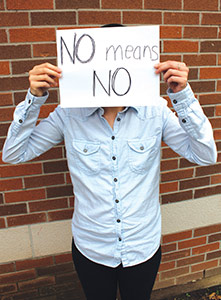Jane, a student at Fanshawe College, speaks about her experience as a way of educating people on sexual assault and consent

Stephanie Lai
Interrobang (Fanshawe College)
LONDON, Ont. (CUP)—This was the night Jane was sexually assaulted.
She had just broken up with her boyfriend of two and a half years and found herself at a party, drunk for the first time and looking for some fun.
“I grabbed this guy and was like, ‘Let’s go make out,’” she said.
“And so we did.”
Jane, a student at Fanshawe College (whose name has been changed to protect her privacy), spoke about her experience with sexual assault in light of this year’s Silence Isn’t Consent campaign, which started Oct. 20.
Jane’s male stranger suggested that they move to a quieter place.
“I was naïve,” she said. “I didn’t really think people had sex at parties.”
He started to take her clothes off
“I kept saying, ‘No, I don’t want to do this, I’m not that kind of girl.’”
He kept pushing and insisting despite her efforts.
“He wouldn’t let me leave the room and so finally I said yes, and I was drunk,” she said. “I was forced into saying yes.”
Prior to the assault, Jane admitted that she didn’t know much about the matter.
“I thought it was something that happened when you walk down the street alone at night and some stranger (would) grab you and rape you down an alley,” she said. “I didn’t know that when you’re drunk you can’t give consent.”
Const. Ken Steeves from the London Police Service says that each incident is investigated independently and that there is no law that indicates that it is illegal to have sex with someone who’s consumed alcohol.
However, he said it becomes an issue when someone is too intoxicated or passed out he/she cannot give consent.
When engaged in intercourse and someone verbalizes that he/she no longer wants to continue – it has to stop.
“Once they verbalize that they no longer want to engage in the act and it continues, it is then termed sexual assault,” said Steeves.
Jane blamed herself for the assault.
“I felt like it was my fault for the longest time,” she said. “Looking back on it now, I didn’t consent to that. You can’t consent when you’re drunk. You can’t consent when someone’s forcing you to do something you don’t want to do.”
After the assault, she dealt in a way she could.
“When some people get assaulted, they’ll be scared of physical contact and they’ll withdraw … I went the exact opposite way.”
It wasn’t until she was in university volunteering in the school’s sexual violence prevention committee that she became an advocate for educating males and females about consensual relationships.
“I didn’t understand why I was acting that way until a couple of years ago when I got involved with sexual assault awareness I realized what he had done to me was not okay and that’s why I was acting the way I did,” she said.
Today, Jane is passionate about educating people about consent.
“It’s really drove me to this path to educate people,” she said. “I believe that people should be educated and then we could lower those numbers of people getting sexually assaulted.”
If she could, Jane said she would even try to educate her attacker.
“I’d want to tell him when I’m intoxicated I cannot give consent,” she said. “When I say no, it doesn’t mean try harder.”
“This sounds ridiculous and I should hate him—and I do, he makes me feel uncomfortable—but at the same time maybe he didn’t know what he was doing was wrong in this situation. Maybe he (didn’t) know better.”
Healing was gradual for Jane, but she hopes that victims start the process by not blaming themselves.
“Know that it’s not your fault,” she said. “If you did not want to do something—even if you didn’t say no and you didn’t say yes—it’s not okay.”
She hopes that her story will help in more than one way.
“I think (my story) could help people realize that you cannot consent when you’ve been drinking and that no means no,” she said. “By talking about this and understanding my actions (it) might help someone who’s going through the same thing understand why they’re acting that way.”
“I accept myself, and I didn’t before.”
This article was originally published in the Interrobang (Fanshawe College)


